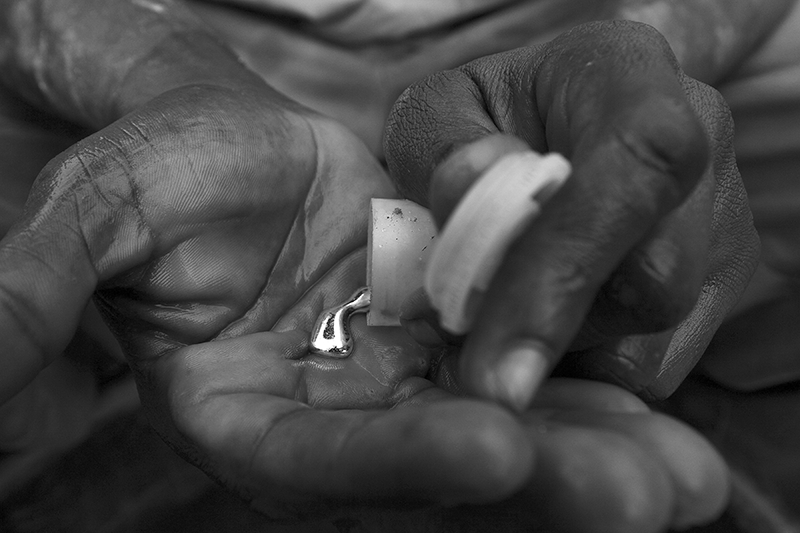
Ibrahim, now 19, started working in Ghana’s artisanal gold mines when he was 14. He has a tremor in his hands, a common symptom of mercury poisoning.
The country has an international reputation for being lax on mercury and the government is acting on concerns that Ghana needs to fix its mercury problem.
One of the world’s top gold producers, the country has about 1 million people working in artisanal gold mining including children who process the precious metal with mercury, a dangerous element that can cause brain damage and death, HumanRightsWatch reports.
Ghana’s rivers, soil, and air are heavily polluted with mercury, and artisanal
miners have shown high levels of mercury concentration in their bodies, according to the New York City-based organization, which conducts research and advocacy on human rights.
Ghana has the highest mercury emissions in Africa, but the problem is widespread, TheEconomist reported. In the past few years, tens of thousands of small-scale mining sites have surfaced across other parts of Africa, as well as Asia and Latin America.
One of mercury’s amazing qualities is its ability to attract gold particles and form a gold-mercury mix. It’s a fascinating substance and one directly tied to the income of a lot of people. When the gold-mercury mix is burned, the mercury turns to gas and leaves behind pure raw gold. It is cheap and easy to mine gold this way, according to HumanRightsWatch.
Ghana’s mining law allows the use of mercury for small-scale gold mining in quantities considered “reasonably necessary.” Mercury is readily available for sale in Ghana’s mining towns. Shops sell it in small quantities or large — too heavy for one person to lift. Traders in neighboring countries travel there to buy it.
Recently in the mining town of Tarkwa, an unusual meeting was held. Miners, government officials and nongovernmental organizations met to discuss how to protect people from the negative effects of mercury. It was the first meeting of its kind in Ghana, and part of a larger process to tackle the negative effects of mercury, according to HumanRights Watch.
HumanRightsWatch interviewed 24 children working regularly with mercury in Ghana. None of them said they knew about the health risks connected to the work. The most vulnerable miners are children, the organization said.
In 2014, Ghana signed the Minamata Convention on Mercury—an international treaty designed to reduce mercury exposure globally. It is named after a Japanese town where mercury poisoning killed at least 1,700 people in the 1950s. The Tarkwa gathering kicked off the development of a national action plan for the reduction of mercury in mining, which the treaty requires, HumanRightsWatch reports.
Ghana has also started training health workers on mercury exposure, and said it wants to be among the first 50 countries to ratify the convention. These are important steps but more needs to be done.
But with mercury deeply ingrained in the mining culture, many people are skeptical about what meetings can accomplish, according to TheEconomist. “Try to put yourself in their shoes,” said Gavin Hilson, a mining expert at the University of Surrey. “We’re trying to tell villagers who have been using mercury their whole lives to change their method. There needs to be a constant presence in that village, to continually educate (them) and show them that there are viable alternatives. It’s a collective responsibility.”
The Ghanian parliament should ratify the treaty and craft a national action plan with businesses and NGOs, says Juliane Kippenberg, associate director of children’s rights for Human Rights Watch. The government should produce a road map for introducing alternatives to gold processing that exclude mercury. It needs to test and treat people suffering from mercury poisoning, and protect those most vulnerable —children.
The alternatives — used by big mining companies — involve heavy machinery and cyanide, another poison, according to TheEconomist. They are expensive and time consuming.
Ghana needs a plan that includes measures to control the mercury trade and steps to end harmful practices such as burning mercury in residential areas, said Human Rights Watch’s Kippenberg.
There are funds available under the convention to support governments that want to act but need resources, Kippenberg said.
Human Rights Watch has offices in at least 15 countries including South Africa and Kenya.
Credit: afkinsider.com


